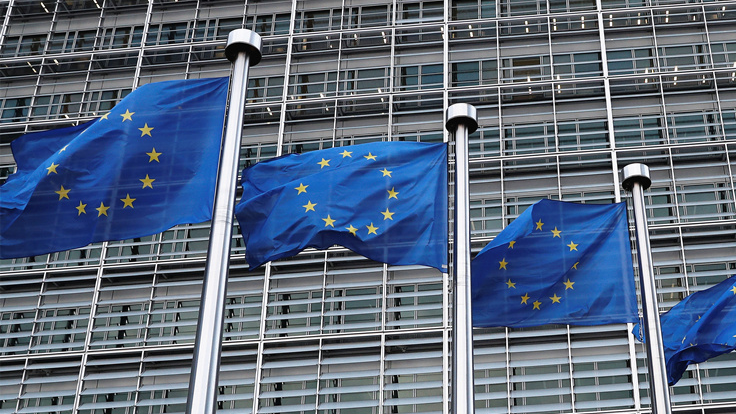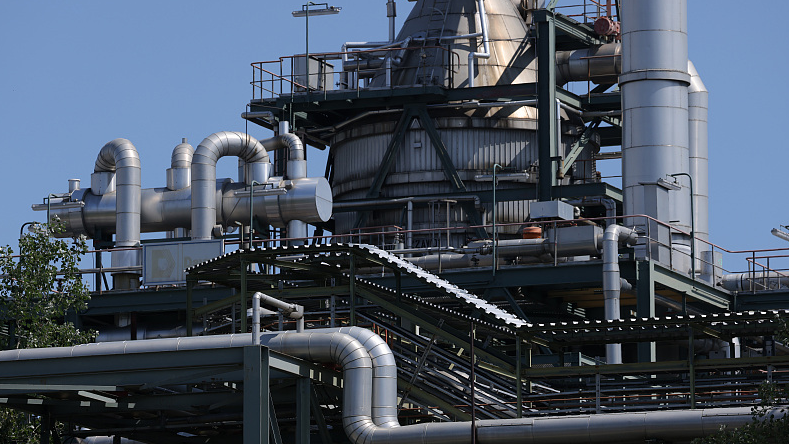
European Union flags flutter outside the EU Commission headquarters in Brussels, Belgium, March 8, 2018. /Reuters
European Union flags flutter outside the EU Commission headquarters in Brussels, Belgium, March 8, 2018. /Reuters
Editor's note: Bradley Blankenship is a Prague-based American journalist, political analyst and freelance reporter. The article reflects the author's opinions and not necessarily the views of CGTN.
European Union lawmakers voted on July 6 to widen the bloc's definition of sustainable activities to natural gas and nuclear. The decision was made after a recommendation from the European Commission – but it has met with intense criticisms from climate activists and officials from some of the EU's 27 member states.
According to critics, this move calls into question the EU's commitment to carbon neutrality by 2050. It could also play into the hand of Russia, the bloc's supposed top adversary. Nonetheless, dividing these objections into two distinct arguments reveals that they are misguided.
For one, some member states have maintained that nuclear energy is "unsustainable." This makes no sense on its face value. Nuclear energy is one of the most efficient source of energy in the universe.
Many countries are still caught in the media storm that followed the Chernobyl or Fukushima nuclear disasters – but such instances are rare.
Some countries, including the Czech Republic, rely on nuclear energy and could not fathom abandoning it in favor of other alternatives. In fact, expanding and modernizing its array, as it plans to do at the Dukovany Nuclear Power Plant, represents the most viable strategy for reducing carbon emissions and moving away from even more "dirty" energy sources like coal.
This is a particularly important issue in Central and Eastern Europe. One of the EU's biggest polluters, Poland, remains dependent on coal as a source of energy. Meanwhile, Poland is developing a nuclear energy program that could begin as soon as 2033 and replace coal by 2043. This alone would be a massive step forward in reaching the EU's carbon neutrality goals.

The Klingenberg natural gas-powered thermal power station, Berlin, Germany, July 4, 2022. /CFP
The Klingenberg natural gas-powered thermal power station, Berlin, Germany, July 4, 2022. /CFP
If other countries adopted or expanded their nuclear energy programs, this would greatly reduce the EU's carbon footprint. There is no question that nuclear energy has the capability to serve Europe's energy needs. The only question is how long it would take to get the reactors operational, which would take quite some time.
In terms of the current reality, eliminating coal is also top on the agenda for the EU, which is why natural gas was recommended as a sustainable activity. There is no doubt that gas is far cleaner than coal in terms of the carbon footprint and eliminating the latter while increasing dependence on the former would be a net positive for the EU's carbon footprint. It's not a perfect solution, but it's pragmatic and represents a step in the right direction.
It should be noted that natural gas is commonly used in conjunction with other sustainable energy, such as wind, solar or hydro. It is often used as a backup energy supply between lapses or shortages of other, greener forms of energy – including by those countries that objected to its inclusion as a sustainable activity.
As to whether this will help Russia, this concern seems irrelevant to the objective of solving the climate crisis. Saying that natural gas is a sustainable activity does not necessarily give preference to Russian-sourced natural gas, even if that is the most logical place it would be purchased from in Europe.
On the contrary, maintaining tensions with Russia and supporting the U.S.-led proxy war against Russia in Ukraine does nothing to serve the climate – or the fate of our species, the safety of which is the implied goal of solving climate change challenges. Funneling a seemingly endless flow of resources into that ongoing conflict, rather than into sustainable energy technology, is harming the EU's climate targets – and would be an "unsustainable" activity.
When it comes to the changing climate, the stakes are far too high for emotions to cloud our judgments. The EU Parliament's recent decision to recognize nuclear and natural gas as sustainable activities may not have been the perfect policy option preferred by climate activists, but it is pragmatic, positive and based on reality. These attributes alone make it a far more effective policy than the usual platitudes we hear from politicians in Brussels regarding climate change.
(If you want to contribute and have specific expertise, please contact us at opinions@cgtn.com. Follow @thouse_opinions on Twitter to discover the latest commentaries on CGTN Opinion Section.)

